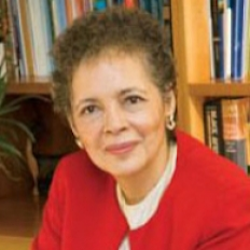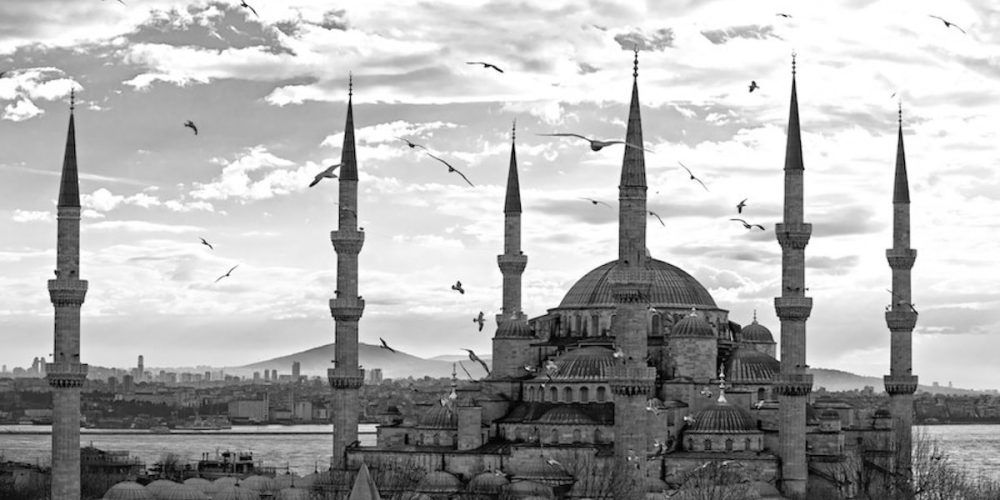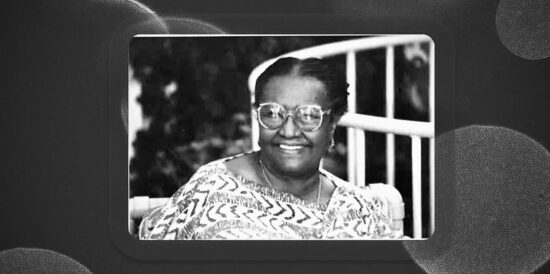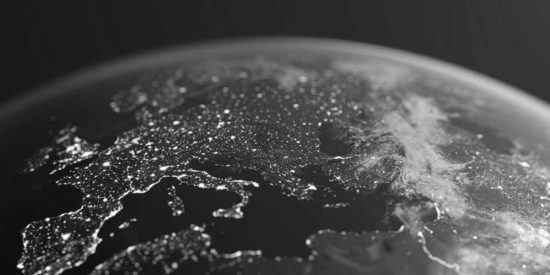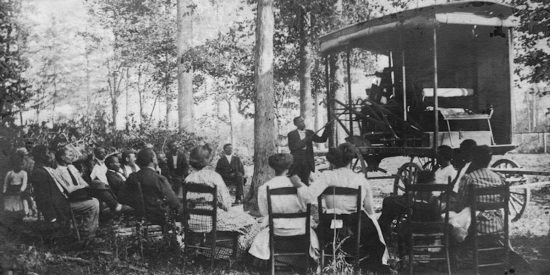Turkey today calls to mind Mustafa Kemal Atatürk. His name means “Father of the Turks,” an honorific appropriate for the man who led the l922–23 War of Independence that toppled the ruling sultans and established Turkey as a secular republic. Inspired to modernize the country by political and social change, Atatürk single-mindedly pushed bold, far-reaching reforms, from adopting the Roman alphabet to giving women the right to vote. Now, as Turkey edges ever closer to full membership in the European Union, revolutionary reforms are being enacted once again. Although the country is 99 percent Muslim—slightly more than when Atatürk held power—this time around Turkey is led by a prime minister viewed as strongly pro-Islamic.
It was Rana Erkan, a television and radio personality from one of Turkey’s most distinguished families, who reminded me that Turkish Muslims are typically more secular than those in Arab nations. They therefore must not—cannot—be viewed through the same lens as those advocating a return to fundamental Islam. Erkan’s comments underscored a tacit suspicion within Turkey that the country’s EU candidacy has not been fast-tracked because Europeans resist bringing an overwhelmingly Muslim population to their doorstep. Yet that very population—60 percent of whom are under 25 years of age—could help resolve two key problems that currently bedevil Western Europe: an aging population and the need for a larger labor force.
Indeed, a growing number of Turks view the EU’s ambivalence about Turkish membership as an affront. At meetings and dinner parties I attended, the question was often raised: Does Turkey need to become a member of the EU at all? Ten years from now, when the crucial vote by current members is scheduled, Turkey may feel there’s more benefit outside the EU than in it. In the meantime, Turkey marches toward Europe; in October the EU is scheduled to report on the progress the country has made in meeting EU criteria.
Thus Turkey moves forward politically, economically, and socially at an exciting—sometimes-dizzying—speed. One drag on its forward momentum, however, is the weight of a painful history. In April 1915, as the Ottoman Empire underwent its terminal fragmentation, leaders of the Turkish province of Armenia were rounded up and arrested in Istanbul; later on, the world learned that they had subsequently been killed. In the next few years, Armenian men, women and children were exterminated en masse or summarily deported. As of 2006, 16 governments worldwide have agreed that this was nothing less than genocide—an organized campaign to wipe the Armenian population off the map.
A foreigner’s mention of the word “genocide” in conversation with native or expatriate Turks is practically guaranteed to elicit an emotional response. Some may concede that a “massacre” occurred, but most resist characterizing it as genocide. Such an absolutist and unilateral term, many Turks feel, fails to tell the entire story. The conversation can than quickly devolve into divisive semantics, with detours into the actual number of Armenians killed and the charged question of reparations.
This is not to say that the Turkish government is ignoring the issue. Quite the contrary: Prime Minister Recep Tayyip Erodgan has proposed a joint commission of Turkish and Armenian historians to research the matter. But the President of Armenia rejected that olive branch, insisting that diplomatic relations between Turkey and Armenia must be established first.
One evening I was fortunate to attend a dinner thrown for the visiting Foreign Policy Association delegation in a beautiful old yali (a Turkish mansion) on the Asian side of the Bosporus—the 18-mile-long strait that connects the Black Sea in the north to the Sea of Marmara (and then the Aegean) in the south. Among the movers and shakers in attendance was historian Murat Bardakçi, author of A History of the Ottoman Empire and a columnist for Hürriyet, Turkey’s largest newspaper.
Having just completed another book—this one on Armenia—Bardakçi was eager to tell me about his research on the tome. In his 25 years on the project, Bardakçi amassed a considerable quantity of research and cultivated the friendship of families who could share important factual information. Far shy of the 1.4 million deaths claimed by the Armenian Diaspora, Bardakçi believes that 360,000 were killed and 600,000 deported. When I pointed out the obvious—that his book was apt to cause a stir throughout Armenia, among the Turkish people, and within the ranks of the Armenian Diaspora, Bardakçi readily agreed. At the same time, however, he is convinced that his lower figures are unassailable.
Will Bardakçi’s stance land him at the eye of a political firestorm? Recent events on the American cultural scene may be indicative. Just before my departure for Turkey, the Public Broadcasting System aired a documentary on “The Armenian Genocide” followed by a panel discussion “Exploring the Issues,” in which some participants maintained that the events of 1915 had not, in fact, constituted genocide. Their contrarian view led one third of the more than 340 PBS affiliates that showed the documentary to cancel the broadcast of the panel discussion. The controversy is a revealing sign that even within the United States, Turkey is under scrutiny for how it will confront its past as it seeks to join a European future.
Politics aside, a social vibrancy infuses Istanbul that feels reminiscent of nervy New York City. The dynamism is fueled in part by men and women busy working hard to keep Turkey’ vigorous economic engine growing, particularly through dealings with the outside world. Perched comfortably atop the business community is Mustafa Koç, chairman of Koç Holding Company and a member of one of the wealthiest families in Turkey. He hosted our delegation at a lunch at the Rahmi Koç Museum, established by his father in 1991 and showcasing historical exhibits related to transportation and indusstry—a mainstay of the Koç family business.
As I talked to Koç a portrait emerged of an unpretentious man—one who is passionate about business and politics and proud of his family and their cultural and philanthropic contributions to the country. Koç grows animated in discussing the upcoming national elections slated for 2007; Turkey’s economic stability and growth; and the likely impact of the nation’s admission to, or exclusion from, the European Union. Bullish about his business and the country’s future, Koç seems to embody both the progress Turkey has already made and the potential it displays for continued economic growth. “Cultural confidence” barometers such as Koç merit especially close monitoring because of Turkey’s strategic significance on the global stage. Both its location and its population offer to mitigate the dangers of terrorism worldwide—and its potential to destabilize the region.
As Turkey facts the future, one of its toughest challenges will be education. A shortage of universities allows an admission rate of only 10 percent of secondary school graduates; the remaining 90 percent fall in and out of the labor force, a disconcerting prospect for a country with an overwhelmingly young population. As one Turkish woman told me, “We were so busy having to spend on other things that were more pressing at the time, that the country didn’t develop enough universities.” Turkey is working hard to make up for lost time.
A vivid geographic reminder of Turkey’s unique position at the crossroads of Europe and Asia, the glittering Bosporus is the pulsing aorta of Istanbul old and new. It is also is perfect for a sea cruise on a sunny day, especially aboard the 400-foot Savarona, purchased by the Turkish government for Kemal Atatürk as his presidential yacht and now leased by shipping magnate Kahraman Sadikoglu. As the opulent vessel plied the waves and our delegation crowded the teak decks topside for a reception, Sadikoglu’s wife, Julide, told me about the time, 25 years ago, when her husband first laid eyes on the Savarona. It was just a charred hulk then, Julide recounted, having been torched by a suspicious fire in 1979, but Sadikoglu saw its potential. “One day,” he promised Julide,” I will own it.” After the Turkish government gave Sadikoglu a 49-year lease on the vessel; he then spent three years restoring the Savarona to a glory that—like Turkey itself, perhaps—honors its past and heralds its future.
The shores of the Bosporus also happen to offer a majestic venue for the city’s more breathtaking villas, and it was here in the evenings that our delegation came in contact with men and women eager to discuss world events and to unveil the secrets of a native city that even they see as unique, beautiful, and somewhat mysterious. With a certain predictable sinuousness, the conversational thread often came around to a self-conscious question: “What do you think of Turkey?”
It’s hard to know where to start in answering that query, but my customary point of departure was some variation on the theme of Turkish riches, be they culinary, social, or political. Nor can the country’s warmth be denied: Turkish society, for all its cosmopolitan chic, exudes a genuine hospitality that embraces the visitor, making her feel instantly at home and mentally projecting a return visit.
From the magazine: FOREIGN POLICY FORUM


